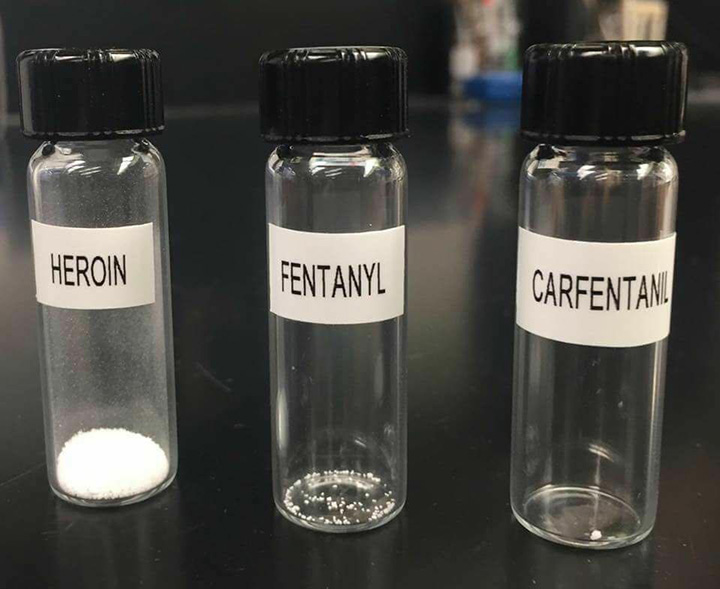The Alberta government has declared a public health crisis in response to the increasing number of deaths due to opioid overdoses in the province. The province is spending an additional $30 million and setting up a 14-member commission to address the issue.

A crisis declaration is different from a public health emergency, but what it does is coordinate the powers the health minister has to deal with the issue.
More than 100 people died of apparent fentanyl overdoses in Alberta in the first three months of 2017, and in Wednesday’s news conference Associate Minister of Health Brandy Payne said rapid response is critical.
“The new Minister’s Opioid Emergency Response Commission will guide the province’s continuing work and ensure each action we take will reduce the harms to opioid users, their families, their communities and first responders,” Payne said.
The new panel includes representatives from medical, police, community and indigenous groups.
“Alberta has already taken many actions to address the opioid crisis,” Dr. Karen Grimsrud, Alberta’s chief medical officer of health, said. “The diverse membership and expertise of the new commission will allow us to build and strengthen the actions already in place to prevent drug overdoses and advise on additional steps that can be taken.
“Our aggressive and coordinated approach will continue to focus on getting Albertans who use substances the help they need.”
Watch below: The Alberta government announced Wednesday it will spend an additional $30 million to tackle the opioid crisis in the province. But is it enough? Hear from Dr. Hakique Virani, public health and addiction medicine specialist from the University of Alberta.

Among the speakers at Wednesday’s news conference were member of “Moms Stop the Harm (MSTH)” – a network of Canadian mothers and families whose loved ones have died due to substance use.
“I’m pleased that the family voice is being included on the commission,” said Petra Schulz, a member of MSTH who was selected to be on the commission.
“My son Danny died of an accidental overdose. I don’t want one more family to suffer such a tragic loss. Today’s announcement gives hope that lives will be saved.”
The province is also looking at expanding public coverage of drugs, such as methadone, that are used for opioid replacement therapy.
The new money means a total of $44 million has been allocated in this year’s budget to deal with a rise in opioid addictions. The government has already expanded the use of drugs such as naloxone that can save the lives of overdose victims.
READ MORE: Think fentanyl’s danger is exaggerated? P.E.I. police photo shows otherwise
Liberal Leader David Swann says as the crisis worsens, the province is focused on optics and not on getting the job done.
“(The panel) is clearly designed to take the heat off government and bring in stakeholders, many of whom have already had input into the process but are waiting for stronger leadership and a plan,” said Swann, who is a doctor.
He said that despite rising death tolls, the province has yet to deliver a blueprint to get timely care for those trying to break free from opioid addiction.
Progressive Conservative critic Mike Ellis said the panel is a promising step, but said the province needs to take more proactive action immediately including better public education.
“We are in a public health emergency,” he said.
Wildrose Leader Brian Jean said time is critical. It took two years for the government to assemble a panel, he said.
“It’s far overdue.”
Earlier this month, Alberta Health said 91 per cent of the deaths so far this year occurred in larger cities, with 51 deaths in the Calgary area and 36 in the Edmonton region.
The crisis has led to a significant increase in hospital visits over the past couple of years. In 2016, there were 9,037 emergency and urgent care visits related to opioids and other substances, Alberta Health said. That compares to 7,516 visits in 2015
Fentanyl is very easy to get. Recently, Global News, 680 CJOB and former federal prosecutor Bruce MacFarlane teamed up to find out just how easy it is to buy fentanyl and carfentanil online using the dark web. On it, MacFarlene was able to be connected with a purported fentanyl dealer.
He offered to sell MacFarlene a kilogram of fentanyl for $2,000 and ship it overnight via FedEx or UPS – and if it was intercepted, the dealer would do a re-shipment.
WATCH: Bruce MacFarlane phones a purported fentanyl dealer, who offers to FedEx the deadly opioid drug overnight from California.

The federal government recently passed legislation aimed at curbing the influx of opioids into Canada.
READ MORE: New legislation good first step but not enough to curb fentanyl crisis: NDP critic
Bill C-37 received royal assent last week. It streamlines the approval conditions for safe injection sites and allows Canada Border Services Agency (CBSA) agents to inspect packages that weigh less than 30 grams. Previously, agents had to ask permission from the person sending the letter to inspect it.
— With files from Caley Ramsay, Vassy Kapelos, Sean Leslie and Katie Dangerfield, Global News and The Canadian Press.






Comments